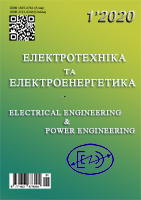Energy efficiency control systems of technological processes and the ways to improve them
DOI:
https://doi.org/10.15588/1607-6761-2020-1-5Keywords:
Energy efficiency control, rationing of energy consumption, promptness, informativeness, accuracyAbstract
Purpose. To identify the disadvantages of the existing systems of energy efficiency control of production processes and the reasons for their occurrence, to analyze requirements for modern control systems.
Methodology. Analyzing disadvantages of the existing control systems, comparing and determining their capabilities in a market economy, generalizing the received results.
Findings. The functionalities of the existing energy efficiency control systems do not correspond to the current conditions of production processes, that create problems for determining the content and implementation of energy saving measures. Low efficiency of the control systems is caused by the limited capabilities of the existing methods of calculating the normalized values of energy consumption, the lack of prompt assessment of the factors affecting the final result of energy efficiency, as well as the significant cost of modern energy metering. The limitation of the information component of control is that there is a difficulty in identifying from the set of factors influencing the achieved level of energy efficiency component, which is associated with the activity of service personnel in the implementation of energy saving measures. There is a need to improve the accuracy of calculating the normalized values of energy consumption. The ways to eliminate existing problems are to determine the patterns of formation of normalized values of energy consumption in terms of operational control, application of new approaches to assessing the effectiveness of impact factors, justification of errors in calculating normalized values of energy efficiency, creating and determining criteria for energy consumption in the periods related to the reporting of the enterprise. The implementation of these actions involves a significant change in views on the organization of the control procedure, technical and information support for its implementation.
Originality. For the first time, a comprehensive improvement of the existing energy efficiency control systems, basing on increasing their efficiency, information content and the reliability of data, are proposed. For the first time, the causes and demonstration of the disadvantages of the existing control systems in modern production are analyzed.
Practical value. Certain areas of research are identified, their implementation will expand the functionality of energy efficiency control in modern conditions and will increase the efficiency of production process management.
References
Кudrin, B.I., Zhilin B.V., Matinina U.V. (2013) Elektrosnabzhenie potrebiteley i rezhimyi. М.: Izdatelskyi dom МEI, 412. (in Russian)
Gofman, I.V. (1966) Normirovaniye potrebleniya energii i energeticheskiye balansy promyshlennykh predpriyatiy .М.: Energiya, 319.(in Russsian)
Pivnyak, G.G., Vypanasenko, S.I., Hovanskaya O.I., Hatskevych U.V., Dreshpak, N.S. (2013). Systemy enerhomenedzhmentu ta yikh matematychne zabezpechennia. D.: Natsionalnyi hirnychyi universytet, 214. (in Ukrainian)
Vypanasenko, S., Dreshpak N. (2013) The features of energy efficiency measurement and control of production processes Energy efficiency improvement of geotechnical systems, 1, 71-78.
Vypanasenko, S., Dreshpak N. (2015) Informational and methodological support for energy efficiency control Power Engineering, Control and Information Technologies in Geotechnical Systems, 2, 53-57.
Rodionova, V.N., Vladymirova, I.S (2007). Sovremennyye tendentsii razvitiya organizatsii proizvodstvennoy deyatelnosti na predpriyatii. Organizator proizvodstva, 4-8 (in Russian)
«Pro energozberezhennya» [Elektronnij resurs]: Zakon Ukrayini [Prijnyatij postanovo Verkhovnoyi Radi Ukrayini № 75/94-ВР від 01.07.94.– Rezhim dostupu: https://zakon.rada.gov.ua/laws/show/74/94-%D0%B2%D1%80. (in Ukrainian)
Rambabu Pothina, Vladislav Kecojevic (2007). A Gyratory Crusher Model and Impact Parameters Related to Energy Consumption. Minerals and Metallurgical Processing, 24(3), 170-180.
M. Silva, A. Casali. (2015) Modelling SAG milling power and specific energy consumption including the feed percentage of intermediate size particles Minerals Engineering, 70, 156-161.
Napadovska, L.V.(2000) Vnutrishnohospodarskyi kontrol v rynkovii ekonomitsi. Dnipropetrovsk, 224. (in Ukrainian)
Pantelieiev, V.P. (2009) Kontseptsiia vnutrishnohospodar-skoho kontroliu diialnosti pidpryiemstv: meto-dolohiia, orhanizatsiia, rozvytok: avtoref. dys. na zdobuttia nauk. stupenia d-ra ekon. nauk: 08.00.09 , 42. (in Ukrainian)
James G. Donovan. (2003) Fracture toughness-based models for the prediction of power consumption, product size, and capacity of jaw crushers. Dissertation submitted to the Faculty of the Virginia Polytechnic Institute and State University in partial fulfillment of the requirements for the degree of Doctor of Philosophy in mining and minerals engineering. Blacksburg, 211. – Режим доступу: https://vtechworks.lib.vt.edu/bitstream/handle/10919/28544/Dissertation.pdf?sequence=1
Ozhehov, A.N. Sistemy ASKUE (2006). Kyrov: Yzd-vo ViatHU, 102 .(in Russian).
Adamatzky A. (2017) Advantages in unconventional computing. Prototypes, Models and Algorithms. Springer International Publishing, 812.
Albers V., Still B. (2011) Usability of complex information systems. Evaluation of user interaction. CRS press, 392.
Aslaksen E. (2008) Designing complex systems. Foundations of design in the functional domain. Auerbach publications, 176.
Barrera D., Diaz M. (2011) Communicating systems with UML 2. Modelling and analysis of network protocols. ISTE ltd, 268.
Boehm B. (2010) A spiral model of software development and enhancement. Object management group, 180.
Downloads
Published
How to Cite
Issue
Section
License
Copyright (c) 2020 N.S. DRESHPAK

This work is licensed under a Creative Commons Attribution 4.0 International License.
Creative Commons Licensing Notifications in the Copyright Notices
Authors who publish with this journal agree to the following terms:
Authors retain copyright and grant the journal right of first publication with the work simultaneously licensed under aCreative Commons Attribution License that allows others to share the work with an acknowledgement of the work's authorship and initial publication in this journal.
Authors are able to enter into separate, additional contractual arrangements for the non-exclusive distribution of the journal's published version of the work (e.g., post it to an institutional repository or publish it in a book), with an acknowledgement of its initial publication in this journal.
Authors are permitted and encouraged to post their work online (e.g., in institutional repositories or on their website) prior to and during the submission process, as it can lead to productive exchanges, as well as earlier and greater citation of published work.

